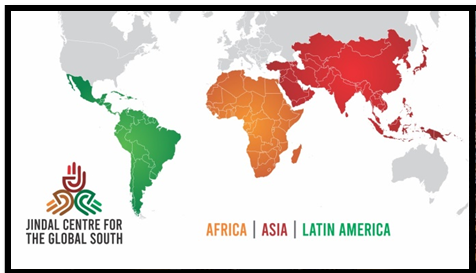GRAND GESTURE, SMALL DETAILS
As it positions itself as leader of Global South, India must be aware of developments, not necessarily on high table
Relevance:
GS 2
- India and its neighbourhood- relations.
- Bilateral, regional and global groupings and agreements involving India and/or affecting India’s interests.
- Effect of policies and politics of developed and developing countries on India’s interests, Indian diaspora.
- Important International institutions, agencies and fora- their structure, mandate.
Why in News:
India hosted a special virtual Summit, called the Voice of Global South Summit under the theme – ‘Unity of voice, Unity of purpose’
Source- JCFGS
A comprehensive assessment of a country’s foreign policy should consider both its grand gestures on the global stage and its attention to small details that often go unnoticed. India, positioning itself as a leader of the Global South, must be mindful of developments beyond the high-profile diplomatic events.
Emphasis on the Global South
- India has emphasized its affinity with the Global South, championing the interests of developing countries in multilateral contexts.
- Initiatives like the “Voice of the Global South” summit underscore India’s commitment to bridging the disparities between advanced and developing nations.
Success Examples as Global South Leader
- COVID-19 Vaccine Diplomacy: India’s “Vaccine Maitri” initiative provided millions of COVID-19 vaccine doses to numerous countries in the Global South, enhancing its reputation as a pharmacy of the world.
- International Solar Alliance (ISA): Co-founded by India, the ISA is a testament to India’s leadership in renewable energy, uniting nations towards affordable and sustainable energy.
- Development Assistance: India has extended numerous lines of credit and developmental projects in Africa, South East Asia, and its neighboring regions, emphasizing its commitment to the growth and stability of the Global South.
- Paris Agreement: India’s role in the negotiation and adoption of the Paris Agreement in 2015 showcased its leadership in addressing climate change on behalf of developing nations. India’s efforts contributed to a global consensus on climate action and equity, aligning with the interests of the Global South.
Setbacks and Challenges as Global South Leader
- UNESCO Election Setback: Discussing India’s unexpected defeat to Pakistan in UNESCO’s election, which raises questions about its strategic outreach and influence among other developing nations.
- Extradition Efforts with Denmark: The complexities of the Kim Davy extradition case underscore the challenges faced in international law and diplomatic negotiations.
- Italian Marines Case: In the Italian Marines case, where two Indian nationals were killed, India accepted the International Tribunal’s Award mandating the trial in Italy.
Broader Implications
- Efficacy in Global South Relations: Analyzing how the UNESCO election loss and extradition issues might reflect on India’s effectiveness and reputation among Global South countries.
- Attention to Small Details: Illustrating the importance of consistent engagement and diligence in international affairs, as seen in India’s handling of various international legal and diplomatic matters.
- Engagement with Developing Countries: The incidents underscore the necessity for India to continuously engage with other developing countries, not only in high-profile summits but also in ongoing, grassroots-level diplomacy.
- Enhanced Focus on Soft Power: India might need to leverage and enhance its soft power more effectively, utilizing cultural, educational, and economic diplomacy to strengthen ties and influence within the Global South.
Balance of Grand and Small Gestures: Concluding that India’s foreign policy effectiveness is judged by its significant diplomatic successes and its handling of detailed international issues, underscoring the nuanced nature of global leadership and relationships.
1st Voice of Global South Summit 2023 – Summary Points
· Event Details: Hosted virtually by India from January 12-13, 2023, under the theme ‘Unity of Voice, Unity of Purpose’. · Objective: Aimed to unite countries of the Global South to share perspectives and priorities on a range of issues, fostering a unified approach. · Inspiration: Inspired by Prime Minister Narendra Modi’s vision of inclusive development (‘Sabka Saath Sabka Vikas Sabka Vishwas aur Sabka Prayas’) and the philosophy of ‘Vasudhaiva Kutumbakam’ (the world is one family). · Context: Addressed pressing global challenges affecting the developing world, including the Covid pandemic, the Ukraine conflict, debt burdens, and food and energy security. · Platform for the Developing World: Sought to amplify the often-overlooked concerns of developing countries on the global stage, providing a dedicated platform for these discussions. · Exchange and Deliberation: Encouraged the exchange of ideas and solutions among participating nations, with a focus on uniting voices and purposes to address common challenges. · Global Influence: As part of India’s ongoing G20 presidency, the summit was positioned to channel the collective inputs of the Global South into broader global deliberations and discourses. |
Source
Indian Express
Mains Question
Q “Explain India’s role as a leader of the Global South in international diplomacy. Provide examples of both its challenges and successes in this role. (150 words)”

 Source- JCFGS
Source- JCFGS Source- MEA
Source- MEA

